2019-20 Progress Report: Mobilizing Canadian Research
The Honourable François-Philippe Champagne, P.C., M.P.
Minister of Innovation, Science and Industry
©️ Her Majesty the Queen in Right of Canada,
represented by the Minister of Industry, 2021
Cat. No. CR1-17E-PDF
ISSN 2563-7444
- Annex I: Self-identification data collection in support of Equity, Diversity and Inclusion
- Annex II: Early Career Researcher data for flagship investigator-initiated research grant competitions
Note: most photos that appear in the 2019-20 Progress Report were taken pre-pandemic, before health measures were in place.
Message from the Ministers
On behalf of the Government of Canada, we would like to thank the Canada Research Coordinating Committee (CRCC) for its efforts in mobilizing Canadian research to meet new challenges and foster a bold and dynamic research enterprise.
Since 2017, the CRCC has been helping to coordinate policies and programs across Canada’s research funding agencies in support of ambitious initiatives important to Canadians. As we look back over the actions taken in 2019-20, we can see how this collaboration is delivering results and driving innovation.
We want more Canadians, particularly those who are underrepresented, to participate in Canada’s research enterprise. We know that initiatives to encourage equity, diversity and inclusion―and to support early career researchers―result in adding more perspectives and bringing more innovation to Canadian research. As well, the Indigenous research and training strategic plan, co-developed with First Nations, Inuit and Métis Peoples will improve research outcomes for the benefit of Indigenous communities.
At the same time, the New Frontiers in Research Fund is enabling Canadian researchers to take their place at the cutting edge of interdisciplinary, international, rapid-response research. Through shared objectives and principles for international research collaboration, the federal research funding agencies are also strengthening Canada’s reputation as a valued partner in international research and innovation.
As we continue to address the global challenge of COVID-19, it is more important than ever that our federal research institutions work collaboratively to address emerging issues rapidly and effectively. The steps forward, highlighted in this report, show how working together around key initiatives can make this a reality.

The Honourable François-Philippe Champagne
Minister of Innovation, Science and Industry

The Honourable Patty Hajdu
Minister of Health
Message from the Chair (2020)
When COVID-19 first appeared in Canada in January 2020, researchers mobilized to gauge the danger, assess existing knowledge, identify resources and prepare a rapid response. In all fields, they turned their expertise to matters of public health: from the development of diagnostic tests, therapies and vaccines, to the production of protective equipment and studies of social behaviour and the many ways pandemics affect our society and economy.
Canada’s research funding agencies mobilized in lock step with the research community. The first call for proposals for rapid response research to battle against COVID-19 was launched jointly by five different agencies on February 10―and that was just the beginning. This unprecedented effort was a testament to the ideals and energy of the Canadian research community and the close collaboration among Canada’s research funding agencies.
Even before COVID-19, that collaboration had increased substantially in 2019-20 as member agencies and departments of the Canada Research Coordinating Committee (CRCC) worked together, on shared priorities, to mobilize Canadian research. We introduced initiatives to increase equity, diversity and inclusion across the research enterprise. We listened to First Nations, Inuit and Métis Peoples who helped shape a new strategic plan for Indigenous research and research training with us. We took steps to bring more early career researchers into the research ecosystem. And we launched new programs to support Canadian leadership in high-risk/high-reward, international, interdisciplinary research. These initiatives helped strengthen our response to COVID-19 and, in the years ahead, will make our research better for all Canadians.
On behalf of my CRCC colleagues, I want to thank the former Minister of Innovation, Science and Industry and the Minister of Health, for placing their confidence in us. I want to thank the dedicated public servants throughout our agencies and departments who have risen to an unprecedented challenge this year. And most of all, I want to thank the Canadian researchers, Indigenous leaders and partners in all sectors who are helping us mobilize Canadian research.
Sincerely,
Michael Strong, MD, FRCPC, FCAHS, FAAN
Chair, Canada Research Coordinating Committee (2020)
President, Canadian Institutes of Health Research

Michael Strong, MD, FRCPC, FCAHS, FAAN
Chair, Canada Research Coordinating Committee (2020)
Executive summary
The Canada Research Coordinating Committee (CRCC) advances federal research priorities and the coordination of policies and programs across Canada’s research funding agencies. It provides a senior strategic forum for sharing information, building consensus and making decisions on forward-looking initiatives that strengthen Canada’s research enterprise.
This report outlines the CRCC’s priorities and the actions taken by member agencies and departments in fiscal year 2019-20 to mobilize Canadian research for the benefit of all Canadians. Highlights include initiatives to:
- Strengthen equity, diversity and inclusion (EDI) in research:
- released the Tri-agency Statement on Equity, Diversity and Inclusion and strengthened the Tri-agency EDI Action Plan;
- launched the Dimensions: equity, diversity and inclusion Canada program;
- awarded Equity, Diversity and Inclusion Institutional Capacity-Building grants;
- adopted a harmonized EDI training plan for agency staff;
- harmonized tri-agency collection of self-identification data for research team members.
- Strengthen Indigenous self-determination, leadership and capacity in research and training:
- released Setting new directions to support Indigenous research and research training in Canada 2019-2022, a plan co-developed with First Nations, Inuit and Métis Peoples that sets out four strategic directions informing the development of new models of support for Indigenous research and training to advance reconciliation.
- Support early career researchers (ECRs):
- strengthened the Tri-agency ECR Action Plan;
- updated the Tri-agency ECR definition to enhance support for ECRs;
- continued to monitor and report on shared tri-agency performance indicators for ECR initiatives;
- adopted balanced funding for ECR-led projects in appropriate flagship research programs and extended parental benefits for emerging scholars.
- Increase engagement in interdisciplinary, international, high-risk, rapid-response research through the New Frontiers in Research Fund (NFRF):
- awarded the 2019 Exploration grants;
- launched the inaugural 2020 Transformation competition and the International stream’s 2020 Horizon Global Platform competition;
- contributed funding to the Government of Canada’s first research response to the COVID-19 pandemic (see last bullet).
- Enhance interagency cooperation on international research:
- released the International Framework: Statement of Objectives and Principles to inform agency decisions in areas of mutual interest and help guide the design of interagency initiatives.
- Support Canada’s research response and recovery to COVID-19:
- allocated $7 million from NFRF to fund research addressing a wide range of issues related to COVID-19, including diagnostics, disease forecasting, public health, public policy, education, community engagement and global coordination.
Mobilizing Canadian research
The Canadian research ecosystem is an essential resource for creating and sustaining our quality of life. It connects researchers in postsecondary institutions and hospitals, government departments, companies and not-for-profit organizations across the country and links them with colleagues around the world. It includes researchers in the Arctic aboard the CCGS Amundsen, graduate students two kilometres underground in SNOLAB, and scientists in advanced containment facilities at the International Vaccine Centre. It includes social scientists analyzing microdata in secure Statistics Canada data centres, humanities scholars pouring over microfiche at Library and Archives Canada and Indigenous researchers working with First Nations, Inuit and Métis communities. And it includes innovators developing new technologies with companies and not-for-profit organizations at the National Research Council.
In partnership with Canadian postsecondary institutions and research hospitals, provincial governments and private-sector organizations, the federal government plays an essential role in sustaining this ecosystem. To ensure that it thrives for the benefit of all Canadians, the government has made significant investments and, in 2017, established the CRCC.
The government called on the CRCC to mobilize Canadian research throughout the ecosystem by coordinating policies and programs and by encouraging risk-taking, interdisciplinary and international research, engaging the knowledge and experiences of First Nations, Inuit and Métis Peoples, the energy of young innovators and the talents of all Canadian researchers.

CRCC members met with the Minister of Health and the former Minister of Innovation, Science and Industry on January 30, 2020, to discuss research priorities. Front-right: Roseann O’Reilly Runte. Back, left to right: Stephen Lucas, the Honourable Patty Hajdu, the Honourable Navdeep Bains, Simon Kennedy, ISED ministerial staff Amanda Woodley and Sarah Hussaini. Photo credit: ISED
This progress report highlights the 2019-20 accomplishments of the CRCC’s member organizations, working together toward these goals.
Leadership
The CRCC advances federal research priorities and the coordination of policies and programs of Canada’s research funding agencies to address issues of priority and common concern to its member organizations. It provides a senior strategic forum for information sharing, consensus building and decision making on forward-looking initiatives that strengthen Canada’s research enterprise, foster world-leading research and advance the social and economic well-being of Canadians.
The CRCC comprises the executive heads of the Canada Foundation for Innovation (CFI), the Canadian Institutes of Health Research (CIHR), the Natural Sciences and Engineering Research Council of Canada (NSERC) and the Social Sciences and Humanities Research Council of Canada (SSHRC), as well as the deputy ministers of Innovation, Science and Economic Development Canada (ISED) and Health Canada (HC), the president of the National Research Council of Canada (NRC) and the chief science advisor. In 2019-20, they were:
- Alejandro Adem, President, NSERC (Vice-Chair, 2020)
- Ted Hewitt, President, SSHRC (Chair, 2019)
- Simon Kennedy, Deputy Minister, HC (to September 2019), ISED (from September 2019)
- John Knubley, Deputy Minister, ISED (to September 2019)
- Stephen Lucas, Deputy Minister, HC (from September 2019)
- Mona Nemer, Chief Science Advisor
- Roseann O’Reilly Runte, President and CEO, CFI
- Iain Stewart, President, NRC (to September 2020)
- Michael J. Strong, President, CIHR (Vice-Chair, 2019; Chair 2020)
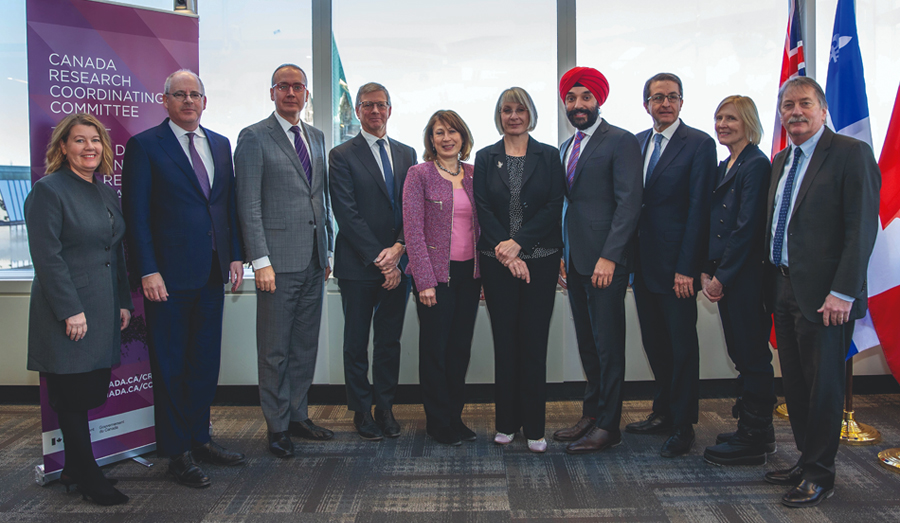
CRCC members with the Minister of Health and the former Minister of Innovation, Science and Industry, January 30, 2020. Left to right: Catherine MacLeod (Executive Vice-President at CIHR, delegate for Michael Strong), Iain Stewart, Simon Kennedy, Stephen Lucas, Mona Nemer, the Honourable Patty Hajdu, the Honourable Navdeep Bains, Alejandro Adem, Roseann O’Reilly Runte, Ted Hewitt. Photo credit: ISED
As per the CRCC’s terms of reference, the position of chair rotates each calendar year between the presidents of CIHR, NSERC and SSHRC. Ted Hewitt, President of SSHRC, chaired the Committee in 2019 and Michael Strong, President of CIHR, assumed that role in 2020.
Vision
The CCRC envisions a coordinated system of federal support that strengthens the research ecosystem and contributes to the social and economic well-being of Canadians. It envisions an integrated and agile, interdisciplinary, international and inclusive system that supports young innovators, encourages risk taking and propels Canadian research excellence.
Priorities
In pursuit of this vision, the CCRC and its member organizations set out to advance the following key priorities for federally funded postsecondary research:
- achieve a more equitable, diverse and inclusive Canadian research enterprise;
- co-develop with Indigenous Peoples an interdisciplinary research and research training model that contributes to reconciliation;
- support early career researchers in exploring innovative ideas and developing their potential;
- increase engagement in interdisciplinary, international, high-risk, rapid-response research; and
- develop a framework for international cooperation and engagement that positions Canada as a valued partner in global research and innovation.
When COVID-19 emerged as a global threat to health and security early in 2020, the CCRC mobilized quickly to address a new, urgent priority: Canada’s research response and recovery. This priority focuses on the needs of Canadians and researchers in this difficult time, recognizing that the research community and federal research funding agencies play a critical role in Canada’s response to the pandemic.
Resources
To advance these priorities, the Government of Canada invested significant resources in Budgets 2018 and 2019. In addition to major investments in core agency programs, Budget 2018 provided the following:
- $275 million over five years, with an annual budget growing to $124 million by 2023-24, for interdisciplinary, international, high-risk, rapid-response research;
- $6 million over five years to improve data collection and $15 million over five years for programs to increase equity, diversity and inclusion in research at postsecondary institutions;
- $3.8 million in 2018-19 to co-develop with Indigenous Peoples a strategic plan for research by and with Indigenous communities;
- $210 million over five years for the Canada Research Chairs Program to attract and retain leading early career researchers at postsecondary institutions while increasing diversity among nominated researchers.
In Budget 2019, it invested:
- $37.4 million over five years, with $8.6 million per year ongoing, to expand parental leave coverage from six months to 12 months for students and postdoctoral fellows.
Engagement
To launch work in all priority areas, the CCRC and its member organizations engaged Canadian researchers, graduate students and administrators in national consultations, completed in 2018. Through regional roundtables, online surveys, written submissions and ongoing engagement with Indigenous communities, collectives and organizations, as well as discussions with the governing bodies of CCRC member agencies, more than 1,500 people helped shape CCRC initiatives in 2019-20.
See the CCRC’s Summary Report on Proposed Measures to Strengthen Science in Canada.
CCRC members continued their dialogue with the research community in 2019-20, engaging delegates at the Canadian Science Policy Conference (CSPC) in a plenary session on the future of research excellence. The concept is always changing as our understanding of what constitutes knowledge, its creation and its use expands. Many of the initiatives described below reflect this evolution and will play an important role in the years ahead, keeping Canadian research on the leading edge of knowledge.
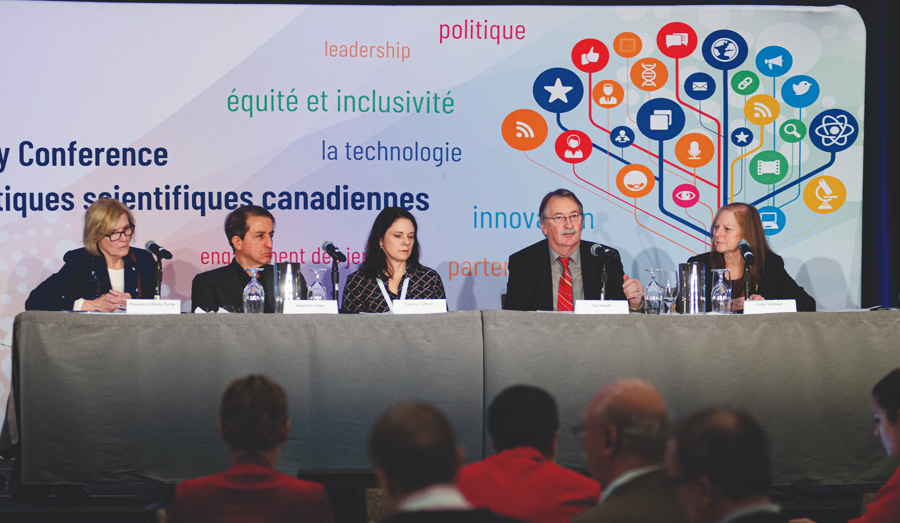
CRCC members discuss the evolution of “research excellence” at CSPC 2019. From left to right: Roseann O’Reilly Runte (CFI), Alejandro Adem (NSERC), Tammy Clifford (Vice-President, Research Programs at CIHR, delegate for Michael Strong), Ted Hewitt (SSHRC) and moderator Liette Vasseur (Brock University). Photo credit: CIHR
Progress
Informed by the insights and advice of Canadian researchers, Canada’s federal funding agencies for postsecondary research, training and infrastructure have worked closely together to advance national priorities, mobilize Canadian research broadly and in the context of COVID-19, and refine our understanding of excellence.
The following pages summarize their progress over the past year.
Priority: Strengthening equity, diversity and inclusion in research
Canada mobilizes its full potential for developing talent, exploring solutions and discovering new insights when the research enterprise is inclusive. By tapping into diverse perspectives from different backgrounds, research has more impact and is more responsive to the needs of society. It is strengthened for the benefit of all.
Yet, systemic barriers and biases remain for underrepresented groups in the research funding system and the research enterprise more broadly. The CRCC, together with the federal research funding agencies, are working with key stakeholders to address these obstacles.
In September 2019, the agencies jointly released the Tri-agency Statement on Equity, Diversity and Inclusion (EDI). The statement reflects a shared commitment to mobilizing an inclusive research culture in Canada and promoting outcomes that are rigorous, relevant and accessible to diverse populations. It supports equitable access to funding, the integration of EDI considerations in research design, increasing equitable and inclusive participation in research, and ongoing data collection and analysis.
As part of this commitment, the agencies have updated and strengthened the Tri-agency EDI Action Plan and have taken important steps in its implementation. The plan sets out two objectives: fair access to tri-agency research support and equitable participation in the research ecosystem. Both objectives include key performance indicators, initiatives and milestones for monitoring success and supporting targeted outcomes.
Within this context, many actions have been taken or are underway to foster greater EDI in Canada’s research ecosystem and strengthen Canadian research.
Actions
Canada Research Chairs Program out front on EDI
The tri-agency Canada Research Chairs Program (CRCP) is administered independently by the Tri-agency Institutional Programs Secretariat. It has been out front in efforts to increase EDI, launching its Equity, Diversity and Inclusion Action Plan in 2017. Equity targets—an important monitoring tool—were set in December 2019 for four underrepresented groups: women, persons with disabilities, Indigenous Peoples and members of visible minorities.
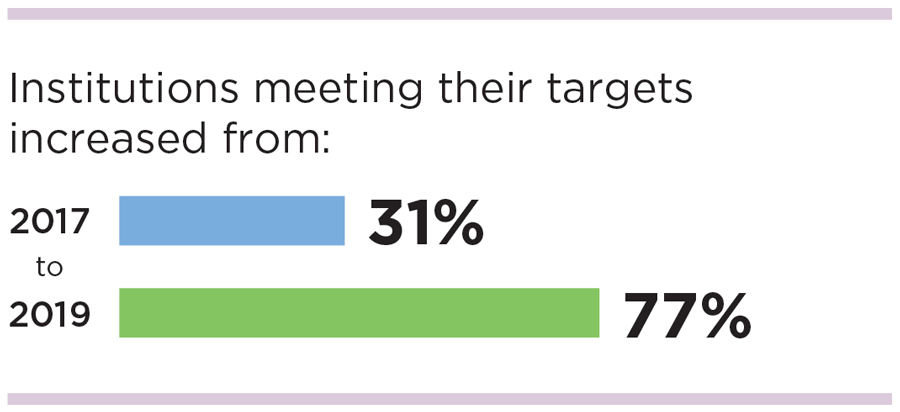
Through this plan, the CRCP is increasing representation for underrepresented groups over time. From 2017 to 2019, institutions meeting their targets increased from 31% to 77%. Targets were again raised in 2019 to meet the objectives of the 2019 Addendum to the 2006 Canadian Human Rights Settlement Agreement. Institutions not meeting their targets can now only submit new nominations from individuals who self-identify in one or more of the four underrepresented groups.
Capacity-Building Grants
The Equity, Diversity and Inclusion Institutional Capacity-Building Grant pilot program awarded $5.3 million in March 2019 to small universities and colleges to help advance EDI. Fifteen institutions received up to $200,000 per year for up to two years to support efforts in eliminating systemic barriers that impede the career advancement, recruitment and retention of underrepresented and/or disadvantaged groups.
In their progress reports, institutions that received grants noted accomplishments such as hiring EDI specialist(s) and implementing EDI data collection, policy reviews and training initiatives. The pilot’s second round application process runs from September 2020 to March 2021 and is again open to small universities, colleges and CÉGEPs.
How some smaller universities are using EDI Institutional Capacity-Building Grants to advance EDI
- Cape Breton University (CBU) created an online education program "Learning about the L'nu Way." The program provides foundational knowledge on who the L'nu (Mi'kmaq) are, their history and culture, and the rights-based challenges they face in Canadian society today. The learning experience is available to current CBU staff and will be part of the intake process for all new members.

Cape Breton University’s Learning about the L’nu Way program begins with a one-hour video, “Learning about the Mi’kmaw Creation Story,” told by Stephen Augustine, Hereditary Chief of the Mi’kmaq Grand Council and the Associate Vice-President of Indigenous Affairs and Unama’ki College at CBU. Photo credit: Cape Breton University
- University of Regina created a position for an Equity, Diversity and Inclusion Officer for Research. It now has a dedicated expert to lead EDI initiatives across the research portfolio.
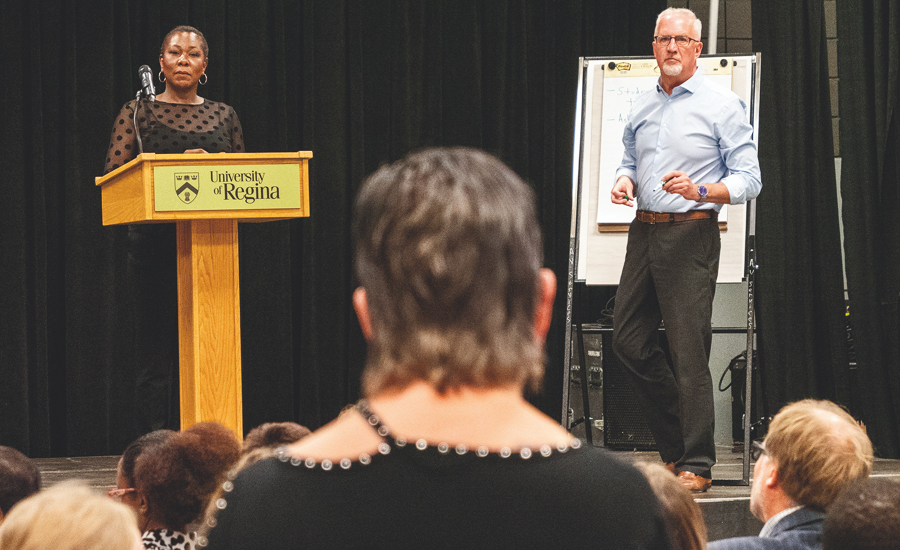
Pauline Streete, EDI Officer for Research, and Thomas Chase, Interim President and Vice-Chancellor, engage with faculty, staff and students at one of the University of Regina’s townhalls on EDI. Photo credit: University of Regina
Dimensions
On May 9, 2019, the Dimensions: equity, diversity and inclusion Canada tri-agency program was launched to mobilize the transformational and cultural change needed to increase EDI within postsecondary institutions and the research ecosystem. The program recognizes institutional progress made toward instilling a culture of EDI. Modelled after similar programs in the UK, Ireland, Australia and the USA, the program was shaped by 2018-19 cross-country consultations to reflect the Canadian context.
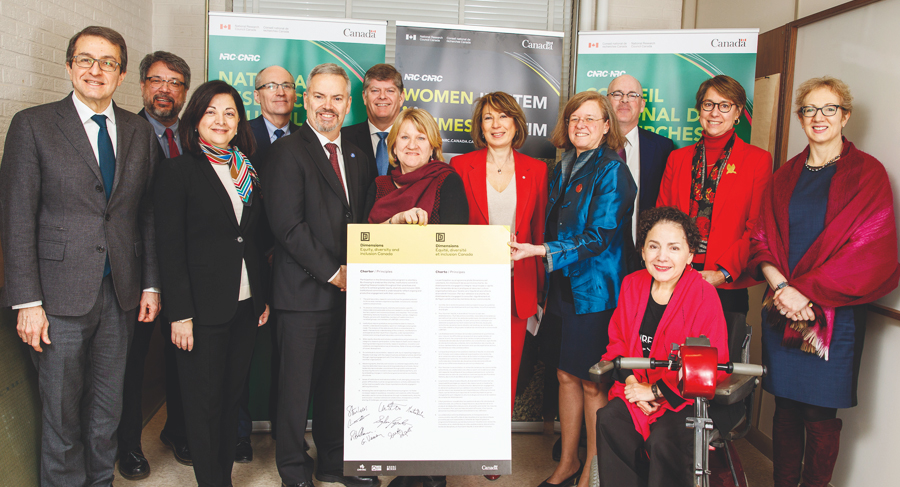
CRCC members Alejandro Adem (far left), Mona Nemer (centre) and Iain Stewart (back, right) with the Dimensions Charter signed by federal government departments and agencies at the Celebrating Government of Canada Women in STEM Symposium, February 11, 2020. Photo credit: NRC
Dimensions addresses systemic barriers in research, particularly those experienced by members of underrepresented or disadvantaged groups, including, but not limited to, women, Indigenous Peoples, persons with disabilities, members of visible minority/racialized groups and members of LGBTQ2+ communities. A voluntary initiative, the program includes:
- Dimensions Charter: Institutions that endorse the Dimensions Charter commit to embed EDI principles in their policies, practices, action plans and culture. To date, more than 110 research-focused institutions and 10 federal government departments and agencies in Canada have endorsed the charter.
- Dimensions pilot recognition program: From a group of 40 that applied, 17 Canadian postsecondary institutions were selected to develop a program that publicly recognizes―through a non-monetary award system―efforts and progress in increasing EDI. The other institutions (affiliates) remain engaged. All institutions across Canada will learn and benefit from this program.

"For Ryerson researchers—undergrads, grads, postdocs and faculty—participating in the Dimensions Pilot unites us all around key questions of EDI before we form or join a research team or write a grant. We have Dimensions teams in every faculty, and in the Yeates School of Graduate Studies, looking at best practices and at barriers specific to each research area. The enhanced attention to EDI by the tri-agency councils has provided a good foundation for the challenges inherent in implementing the Dimensions Pilot."
Art Blake (he/him), Director, Dimensions Pilot Program and
Professor, Department of History at Ryerson University.
Photo credit: Alia Youssef
Other initiatives
Strengthening EDI to mobilize a more vibrant research enterprise requires ongoing effort and a multi-faceted approach. Other actions taken include:
- Harmonized EDI training plan for agency staff: Adopted by CFI, CIHR, NSERC and SSHRC in December 2019, the plan outlines mandatory EDI training for all agency staff, as well as external review, selection, governance and advisory members. It includes common elements, such as Gender-based Analysis Plus (GBA+) training, and more customized EDI training tailored to agency-specific needs. It provides concrete steps for building a stronger EDI competency in each agency, through training in unconscious bias and proactively addressing barriers, and by providing tools for assessing how diverse groups experience policies, programs and initiatives.
- Harmonized collection of self-identification data for research team members: Building on the launch of a harmonized self-identification questionnaire in 2018, in 2019-20 the agencies and the CFI continued to work together to collect and analyze self-identification data for research team members Footnote 1 to evaluate ongoing progress in EDI.
- New Frontiers in Research Fund includes EDI as an evaluation criterion: Successful applications must reflect a commitment to EDI and consider identity factors in research design when applicable. To support this, the program released the Best Practices in Equity, Diversity and Inclusion in Research Guide in September 2019 to increase stakeholders’ EDI awareness and understanding.
To view reporting on EDI by the federal research funding agencies and the CFI, go to Annex I: Self-identification data collection in support of equity, diversity and inclusion.
Priority: Strengthening Indigenous self-determination, leadership and capacity in research and training
Mobilizing and building Indigenous research capacity in Canada requires a new approach that speaks to the experiences, knowledge and leadership of Indigenous Peoples. Reconciliation with First Nations, Inuit and Métis is an ongoing commitment of Canada’s research funding agencies. It is part of the Government of Canada’s efforts to establish a new relationship with Indigenous Peoples—one that creates a more equitable and just society that acknowledges the importance of Indigenous knowledge systems, based on a guiding principle of mutual respect.
In 2018-19, the agencies engaged with Indigenous communities and organizations across the country to listen and learn from their experiences and insights on research and research talent development. First Nations, Inuit and Métis Peoples informed the creation of a new strategic research and research training plan for the agencies that integrates Indigenous leadership and responds to community needs. This was achieved through regional roundtables held with Indigenous community leaders, students and researchers, the contribution of 110 position papers (developed with support from Indigenous Research Capacity and Reconciliation Connection Grants), the convening of the National Dialogue event, and ongoing engagement with Indigenous organizations and communities.
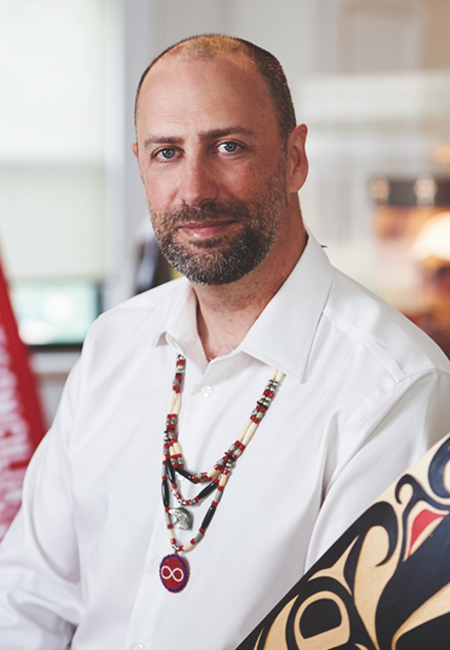
“The National Centre for Truth and Reconciliation (NCTR) celebrates the important work of the CRCC and the tri-agencies, in responding to Call to Action 65 and encourages ongoing efforts across all federal departments and agencies to uphold and advance the Truth and Reconciliation Commission Calls to Action and Principles of Reconciliation.
The NCTR has enjoyed a close working relationship with colleagues at federal research funding agencies in the development of a national reconciliation research strategy. This strategy, with its proactive affirmation of Indigenous organizations, qualifications and research methodologies, represents a significant step forward in ensuring all voices are heard in the search for new knowledge and understanding.”
Ry Moran, former Director, National Centre for Truth and Reconciliation, January 2020. Ry Moran is now Associate University Librarian, Reconciliation, University of Victoria. Photo credit: Nardella Photography
Actions
Strategic plan
Released in January 2020, Setting new directions to support Indigenous research and research training in Canada 2019-2022 identifies four strategic directions that are informing the development of new models of support for Indigenous research and training in Canada:
- Building relationships with First Nations, Inuit and Métis Peoples
- Supporting research priorities of Indigenous Peoples
- Creating greater funding accessibility to research funding agency programs
- Championing Indigenous leadership, self-determination and capacity in research
The plan embodies a new approach, ensuring that Indigenous Peoples set their own research priorities, guide how research is done and how data is used, and have equitable access to research and research training opportunities.
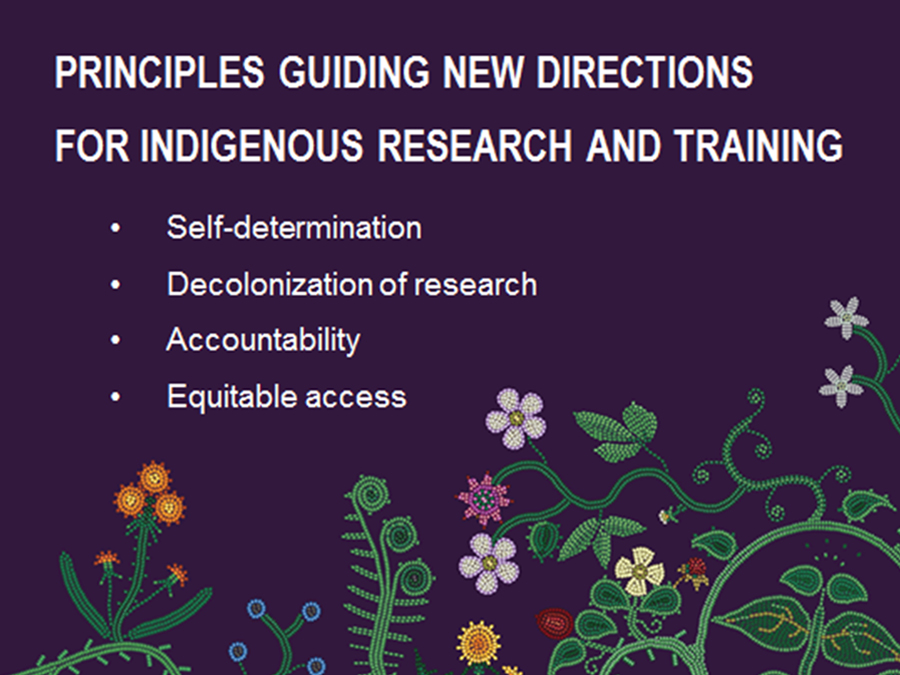
Source: Setting new directions to support Indigenous research and research training in Canada 2019-2022. Artwork: Donald Chrétien
Description of image
This image of Indigenous floral beadwork on a purple background illustrates the four principles guiding the new directions for Indigenous research and training. The principles are self-determination, decolonization of research, accountability and equitable access.
As a key step toward implementing the plan, the federal research funding agencies issued a call in January 2020 for Indigenous individuals with a deep cultural understanding of First Nations, Inuit and Métis research to form a new Reference Group for the Appropriate Review of Indigenous Research. Membership was announced in September 2020, providing a group to advise the agencies and guide the development and implementation of culturally appropriate peer review for research conducted by and with Indigenous Peoples.
Priority: Supporting early career researchers
Early career researchers (ECRs) inspire and drive some of Canada’s most innovative and forward-looking research. By introducing measures to help mobilize their efforts, Canada unlocks new discoveries and strengthens its position as a world leader in research talent development, both now and in the future.
Many ECRs face barriers in developing their potential, including the challenges of establishing research credentials or having them recognized, securing resources, and competing for a limited number of research positions. Overcoming these obstacles by supporting ECRs and their innovative ideas is essential to keeping Canada’s research enterprise dynamic and vibrant.
That’s why the CRCC and Canada’s federal research funding agencies continue to look for ways to strengthen their support for the next generation of research talent.
Actions
- Updated Tri-agency ECR Action Plan: The ECR plan was simplified and enhanced in 2019-20 to include two high-level, measurable objectives:
- Fair access to tri-agency research support
- Equitable participation in the research ecosystem
- Updated Tri-agency ECR definition to better support ECRs and meet program needs: The harmonized definition provides more clarity on how an ECR is defined. It also credits twice the time taken for eligible leaves to reflect the time ECRs need to re-integrate back into a research role. Adopted in September 2019, it will be phased in over time in appropriate agency and tri-agency programs.
Tri-agency ECR Definition
An early career researcher (ECR) is a researcher within five years from the date of their first research-related appointment, minus eligible delays in research, where:
- research-related appointments are defined as those where the individual has the autonomy to conduct research independently; and
- all eligible leaves (e.g., maternity, parental, medical, bereavement) are credited as twice the amount of time taken; and
- professional leaves (e.g., training, sabbatical, administrative) are not credited.
- Shared performance indicators for ECR initiatives: Building on the initiatives undertaken in 2018, the agencies and the CFI monitor and report on harmonized 2019-20 performance indicators for supporting ECRs, a critical step for working together to evaluate ongoing progress.
- Balanced funding for ECRs: In appropriate flagship programs, the agencies committed to dedicating a portion of funding to ECR-led projects, relative to the number of ECR-led applications received. Rollout of this commitment has started. NSERC’s Discovery Grants and the New Frontiers and Research Fund both implemented balanced funding for ECRs in 2019-20.
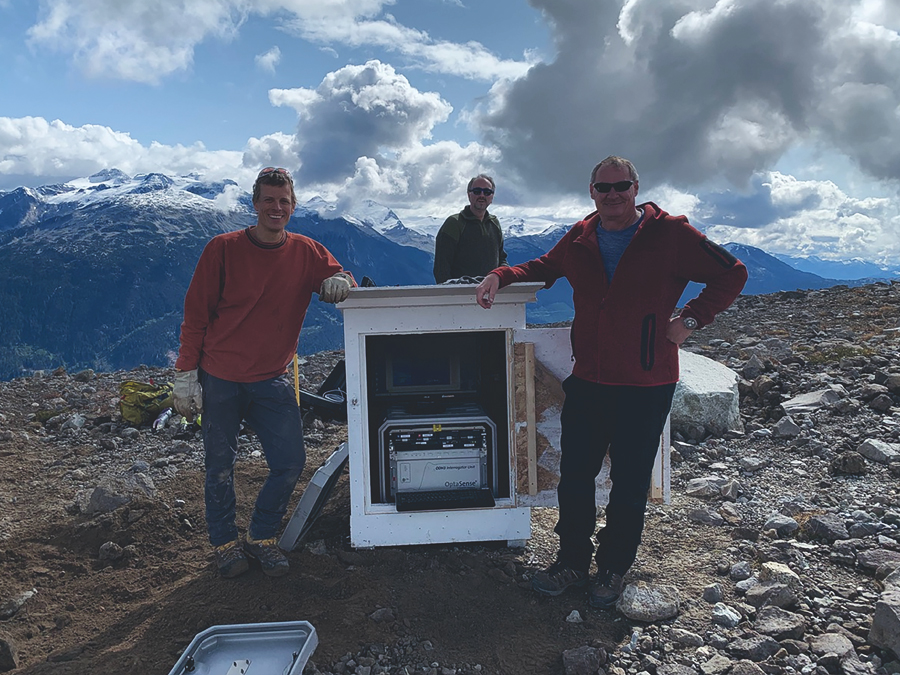
NFRF-funded early career researcher, Assistant Professor Jan Dettmer of the Department of Geoscience at the University of Calgary, is studying next-generation volcano- and landslide-hazard monitoring at the Mt. Meager volcano massif. Through a novel interdisciplinary, cross-sectoral approach, the project is developing new knowledge about volcanoes, slope stability, glaciers, how these complex systems interact, and real-time monitoring technology.
In the photo, Jan Dettmer (left), with PhD student Pejman Shahsavari (centre) and industry partner Jason France (right) of OptaSense, are installing a sophisticated fiber-optic sensing system on the glacier-clad mountain to monitor deformation events. Photo credit: Carson Laing, OptaSense
- Increased parental benefits: Announced in Budget 2019 and part of the Tri-agency ECR Action plan, parental leave coverage for students and postdoctoral fellows who are funded directly or indirectly by agency funds was expanded from six to 12 months in 2019-20 to increase support for emerging scholars during leaves.

- 250 Tier 2 Canada Research Chairs allocated to emerging researchers: Announced in Budget 2018, 250 new Tier 2 Chairs, with an additional $20,000 research stipend for first-term appointees, were added to the Canada Research Chairs Program to develop promising emerging research talent. Institutions continue to fill these positions, with 36 appointments made in 2019-20.

To view reporting on ECR participation in programs offered by the federal research funding agencies and CFI, go to Annex II: ECR data for flagship investigator-initiated research grant competitions.
Priority: Increasing engagement in interdisciplinary, international, high-risk, rapid-response research
Following consultations with Canada’s research community, the New Frontiers in Research Fund (NFRF) was launched in late 2018 to mobilize world-leading interdisciplinary, international, high-risk/high-reward, rapid-response Canadian research. The fund is investing $275 million over five years (2018-19 to 2022-23) and will grow to have an annual budget of $124 million in 2023-24. NFRF has three streams, each designed to support specific goals:
Exploration generates opportunities for Canadians to conduct innovative high-risk, high-reward interdisciplinary research.
Transformation provides large-scale support to build Canadian strength and leadership in interdisciplinary transformative research.
International enhances opportunities for Canadian researchers to partner on international projects.
International research is an important focus of the fund. To meet this goal, the International stream funds Canadians participating in international projects, while the other streams provide Canadian-led projects with the option of including international researchers in the team, who are eligible for funding.
Actions and accomplishments
The year was marked by major milestones and accomplishments in rolling out NFRF’s three funding streams, as well as the introduction of important enhancements and innovations in program design and delivery.
| Competitions
2019 Exploration: Awarded 186 grants (up to $250,000 over two years) in March 2020 to explore high-risk, high-reward, interdisciplinary research: 38% of the awards were for proposals led by ECRs; 29% of projects included an international research participant.

“With 2021 marking the beginning of the United Nations Decade of Ocean Science for Sustainable Development, our ‘Blue Justice Alert’ research project is testing a new paradigm for globally securing small-scale fisheries against the impacts of climate change, urban and tourism development, and changing fishery policies and laws.”
“Our interdisciplinary and international team is incorporating knowledge from diverse fields—including ethics and human rights, sustainable development, sociology, information and decision systems, and fishery management—to build a new mobile, interactive platform from the ground up for helping small-scale fisheries around the world secure their livelihoods. Research team members in Bangladesh, Mexico and South Africa are working closely with local small-scale fisheries for input into the development of the platform and to test use cases. The project’s novel approach, using readily accessible technology, aims to help small-scale fisheries connect with experts and other stakeholders like government. It also aims to assist small-scale fisheries in co-creating solutions that support sustainability.”
Ratana Chuenpagdee, University Research Professor, Department of Geography, Faculty of Humanities and Social Sciences at Memorial University of Newfoundland and recipient of NFRF 2019 Exploration award. Photo credit: Rich Blenkinsopp
2020 Transformation: Launched the stream’s inaugural competition in December 2019 following consultations with diverse stakeholders from Canada’s research community in summer 2019. The competition offers grants between $2 million and $4 million per year over six years for large-scale, Canadian-led interdisciplinary research projects that tackle a major problem or challenge. Interest has been strong with more than 400 notices of intent received in February 2020. Postponed due to COVID-19, the deadline for the invitation-only application is set for April 2021.
2020 Horizon Global Platform: Launched the International stream’s first competition in January 2020 with grants up to $125,000 per year for four years to support Canadian researchers participating in 34 eligible European Union Horizon 2020 projects.
Rapid-response research for COVID-19: Contributed $7 million in March 2020 to the Government of Canada’s first research response to COVID-19. This included funding 15 projects that are examining and developing solutions to address a wide range of issues related to COVID-19, including diagnostics, disease forecasting, public health, public policy, education, community engagement and global coordination.
| Program enhancements and innovations
To move research in innovative directions, the program has the flexibility to try different approaches for selecting projects for funding. In the last year, the following initiatives were introduced or enhanced, many of them helping to advance other CRCC priorities:
Merit review puts ideas first: To help identify truly innovative research, competition evaluation processes focus primarily on the research idea. For example, Exploration competitions use a double-blind merit review process whereby external reviewers are not given information that identifies the research team. NFRF applications are also designed to provide more flexibility in demonstrating expertise and experience than traditional approaches.
Supporting reviewers to embrace risk in Exploration: Recognizing that risk is unavoidable when exploring breakthrough ideas, it is expected that some funded Exploration projects will fail. The Multidisciplinary Review Panel is encouraged to support and recommend the funding of risky projects with the potential for high reward.
Balanced funding for ECRs in Exploration: Introduced in the 2019 competition, ECR-led projects receive funding in proportion to the number of applications received. While ECRs often face barriers in research, their ideas help drive some of Canada’s most innovative and forward-looking research.
Strengthened EDI: Released in September 2019, the Best Practices in Equity, Diversity and Inclusion in Research Guide aims to increase EDI awareness and understanding among NFRF applicants and stakeholders. Achieving a more equitable, diverse and inclusive Canadian research enterprise is essential for Canada to realize its full research potential. Successful applications in all streams—Exploration, Transformation and International—must reflect a commitment to EDI through concrete actions.
Consideration of identity factors in research design: Projects funded through the NFRF program must integrate Gender-based Analysis Plus (GBA+) into the project design. GBA+ considers the impacts of identity factors such as sex, gender, race, ethnicity, religion, age and mental or physical disability. By considering diverse perspectives, research is more rigorous, relevant and accessible to varied populations. When a researcher believes the project has no identity factor impacts, a rationale must be given.
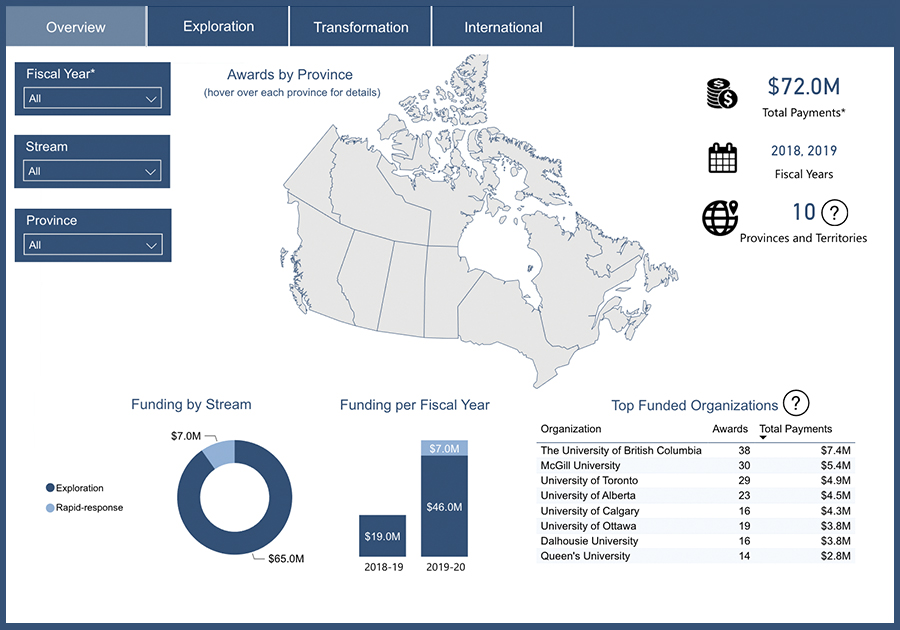
See the New Frontiers in Research Fund’s interactive dashboard for key data on competitions.
Description of image
This screenshot of the New Frontiers in Research Fund’s online interactive dashboard provides a high-level overview of the NFRF’s funding. It shows a map of Canada and key funding data, including funding by stream, funding per fiscal year and the top-funded organizations. Navigation and links are provided. Since the fund’s creation, $72 million has been distributed in fiscal years 2018-19 and 2019-20 in 10 provinces and territories.
The image includes:
- A pie chart that shows that $65 million was awarded by the Exploration stream, and $7 million was granted to the COVID-19 Rapid-response call.
- A vertical bar graph that shows how funds were distributed each fiscal year:
- In 2018-19, $19 million was disbursed by the Exploration stream.
- In 2019-20, $46 million was disbursed by the Exploration stream and $7 million for the COVID-19 Rapid-response call.
- A table that shows the top-funded organizations across Canada, with the number of awards and total payments received:
- The University of British Columbia received 38 awards and $7.4 million;
- McGill University received 30 awards and $5.4 million;
- University of Toronto received 29 awards and $4.9 million:
- University of Alberta received 23 awards and $4.5 million;
- University of Calgary received 16 awards and $4.3 million;
- University of Ottawa received 19 awards and $3.8 million;
- Dalhousie University received 16 awards and $3.8 million;
- Queen’s University received 14 awards and $2.8 million.
For more information on NFRF.
Priority: Enhancing interagency cooperation on international research
Canadian researchers are increasingly seeking out international partners and are being invited to work with colleagues from around the world. These international research collaborations strengthen Canadian research and allow Canadian researchers to contribute to global society.
The scale and scope of international research have increased to such an extent in recent years that funding agencies in many countries are now making concerted efforts to develop, support and sustain international collaborations. In this context, CRCC member agencies set out to develop shared objectives and principles to help guide joint international activities, mobilize Canada’s full research potential and safeguard Canadian interests while positioning Canada as a valued partner in international research and innovation.
Actions
| International Framework
In January 2020, the CRCC released the International Framework: Statement of Objectives and Principles.The framework serves as a reference that complements the international strategies of CRCC member agencies and applies when agencies have converging or intersecting international priorities. It informs decisions in areas of mutual interest and helps guide the design of interagency initiatives with an international component, such as NFRF.
Objectives:
- Develop world-class Canadian research and researchers by engaging global research excellence
- Support Canadian researchers addressing challenges of global importance
- Strengthen Canada’s presence and visibility in the international research community
Principles:
- Supporting excellence in research
- Transparency, independence and merit
- Scientific/research integrity
- Equity, diversity and inclusion
- Open science
Even before the framework was adopted, the CRCC and Canada’s research funding agencies initiated measures consistent with its objectives and principles. They extended support for international participants in all NFRF-funded projects and, in response to the July 2019 Canada-EU Summit Joint Declaration, approved the NFRF 2020 Horizon Global Platform competition.
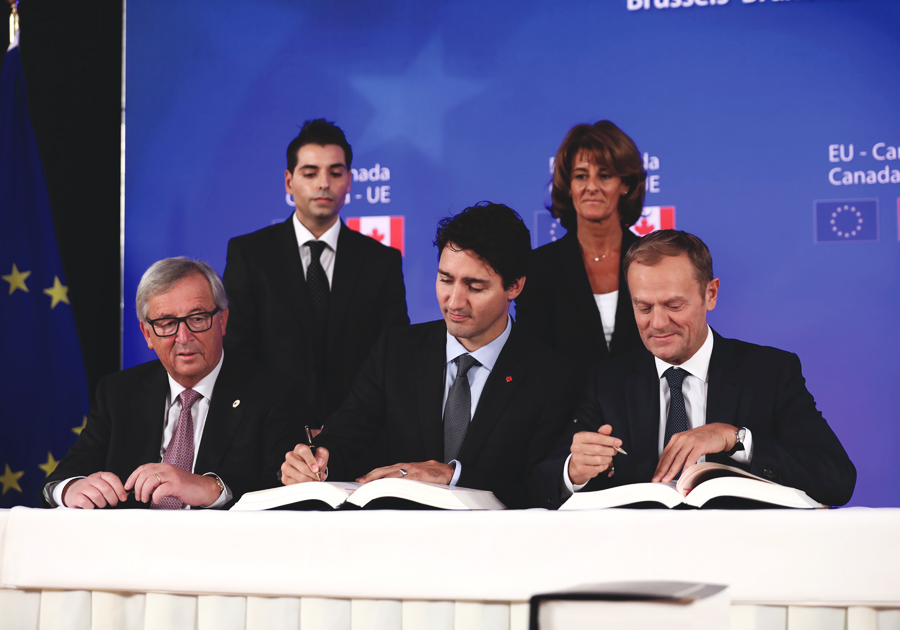
Prime Minister Justin Trudeau and Donald Tusk, the former President of the European Council, sign the Canada-European Union Summit Joint Declaration on July 18, 2019, recognizing the importance of research collaboration and welcoming support, through the New Frontiers in Research Fund, for Canadians participating in international teams funded through Horizon 2020 or Horizon Europe. Photo Credit: Office of the Prime Minister
In February 2019, the CRCC signed a Letter of Understanding (LOU) with UK Research and Innovation (UKRI) to facilitate cooperation in research, innovation and training through shared principles and activities. Building on the LOU, in 2019, Canada’s federal research funding agencies and four UKRI councils announced the Canada-UK Artificial Intelligence (AI) Initiative aimed at building competitive, resilient and healthy economies and societies. In March 2020, funding was provided for 10 projects, investing approximately C$5 million and £5 million over three years to fund interdisciplinary, international AI research teams.
Priority: Supporting Canada’s research response to COVID-19
Since COVID-19 emerged as a threat to Canadians’ health and well-being in January 2020, the CRCC, its member agencies and departments, and the research community have worked closely together to strengthen Canada’s research response and recovery. The first rapid-response call for proposals was launched on February 10 with funding awarded four weeks later.
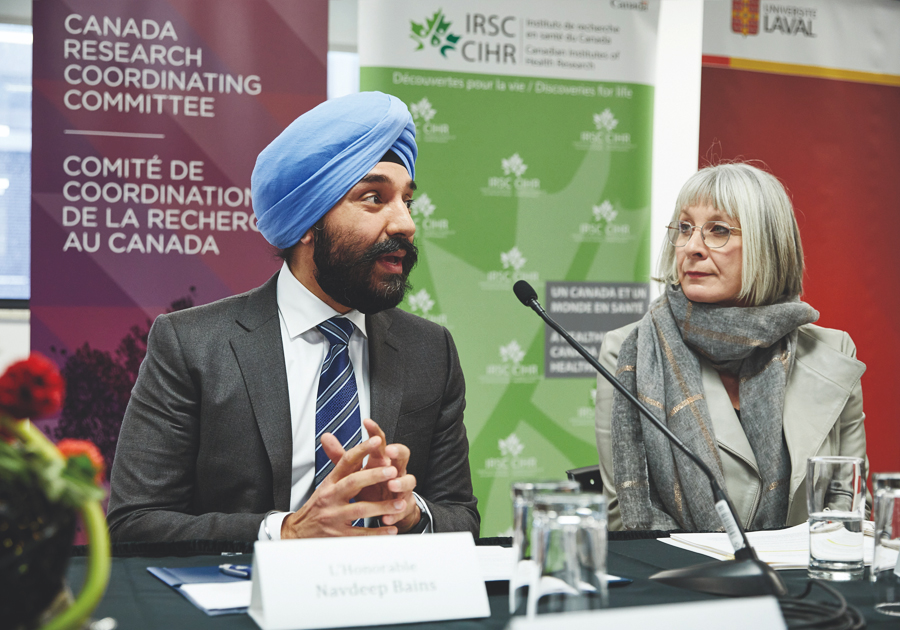
The former Minister of Innovation, Science and Industry, the Honourable Navdeep Bains, and the Minister of Health, the Honourable Patty Hajdu, announced $27 million in funding for Canadian-led COVID-19 research projects on March 6, 2020. CRCC contributed $7 million through NFRF for this initial, rapid-response call. Photo credit: CIHR
As the Steering Committee for NFRF, the CRCC allocated $7 million to this first competition to support projects focused on diagnostics, forecasting, public policy, education and global coordination. In addition, the CRCC extended NFRF deadlines for competitions in progress and topped up 2018 Exploration grants for ECRs to help researchers effectively manage disruptions.

Université Laval’s Professor Louis Flamand chairs the Faculty of Medicine’s Department of Microbiology and Immunology where he leads a NFRF-funded project studying the pathogenesis of COVID-19. At Laval’s Biosafety level 2 lab, Flamand holds a cryo tower of samples preserved at -150°C.
These initiatives, taken in the early days of the pandemic, were only the beginning. Even then, it was clear that mobilizing Canadian research to combat the pandemic would be the first priority for Canada’s research funding agencies and departments well into 2020-21 and beyond.
Building back better—the year ahead

There is no question that COVID-19 changed the lives of all Canadians in 2020. Certainly, it changed the lives of Canadian researchers in every discipline and sector who were called into action—with their international colleagues—to provide a rapid, comprehensive, scientific response to help their fellow citizens. For many, the experience brought home the value of working together and engaging all our knowledge and talent to address our greatest challenges.
It is a realization with implications for Canadians and Canadian science that goes far beyond our pandemic response. COVID-19 is just one example of the complex challenges facing our country that demand interdisciplinary, intersectoral and international scientific cooperation and coordination.
Working together through the CRCC, Canada’s research funding agencies and departments are helping Canadians meet those challenges. In 2019-20, they responded quickly—in unison—to the pandemic. They also took important strides to coordinate policies and programs encouraging risk-taking, interdisciplinary, international research; engaging Indigenous Peoples; energizing young innovators; and mobilizing the research talents of more Canadians across the research ecosystem. The goal is to mobilize a research community as strong and diverse as Canada, which is a source of creativity and innovation for our country and the world.
The goal in 2019-20 will be to sustain and grow that community, to help Canadians meet the pandemic challenge and build back better.